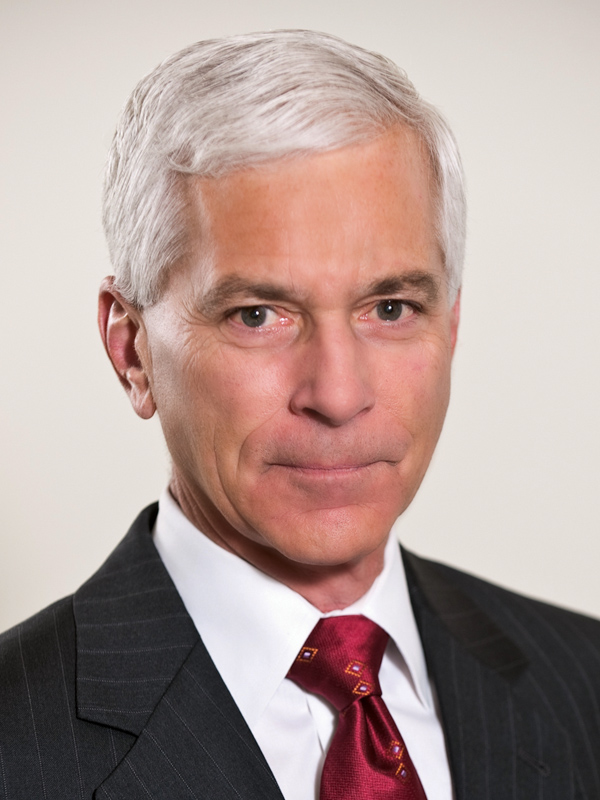

is president and CEO of NACUBO
Many of you know that I will be concluding my 12 years as NACUBO President and CEO with this year’s annual meeting in Long Beach, Calif. It has been a pleasure and an honor to serve our organization and member institutions, and to work so closely with the higher education association community. As I mentioned in last month’s issue of Business Officer, when I accepted this position I knew that it would be the most fulfilling part of my professional career. And, as I prepare to say farewell, I can wholeheartedly say that my work here at NACUBO has far exceeded my professional and personal expectations.
At the same time, I am delighted to welcome Susan Whealler Johnston, NACUBO’S new leader, whom we will introduce to the membership during the annual meeting. Having joined the staff of the Association of Governing Boards of Universities and Colleges (AGB) in 2000, Susan has steadily taken on more responsibility and has served as executive vice president and chief operating officer since 2012. With additional experience as a professor, dean, and university board member, she is well qualified to take the helm of our association.
IT Triggers Transition
As I reflect over the past decade, I’m reminded of how much has changed, not only for NACUBO, but for higher education, the business office, and the world. This year’s annual meeting theme, “Anchored in Culture, Ingenuity, and Pride,” is reflective of the way that technology and innovation challenge us to weave the new into the long-standing traditions that define our campuses.
Clearly, the evolution of technology has allowed us to be more impactful and purposeful, and, in this issue of Business Officer, this topic takes the lead in a portfolio of articles that tell the stories of culture, pride, and ingenuity, and how each of these elements work together—and sometimes separately—to support the goals of the campus community, while keeping the institution anchored in its mission.
In 2006, when I arrived at NACUBO, technology, undoubtedly, had a less-sophisticated look and feel. Fast-forward 12 years, and we now have instantaneous access to the world through smartphones, smart watches, and other electronic devices. In 2006, the smartphone was just beginning to gain popularity; the first iPhone made its debut in June 2007.
In a 2006 interview on “NBC Nightly News,” Steve Jobs, chairman, CEO, and co-founder of Apple Inc., said: “Technology keeps moving and lets us do more and more. We want to bring customers [along] with that and not just leave them using stuff that they could do five years ago, but not the stuff that’s been invented since then.”
And bring customers along, they have. Today, at-home and on-campus systems are equipped to operate lights, televisions, phones, and laptops with a simple voice command; and groceries, ordered from an app, are delivered within the hour. It’s all part of the Internet of Things (IoT), described in the article “IoT Ready?” Florence Hudson, special adviser at Next Generation Internet, explains IoT as “A term used to classify systems where Information Technology plus Operational Technology are deployed together to gather data that can be leveraged for improved outcomes.”
These innovations allow institutions to serve a diverse and rapidly changing student body; inspire collaboration among students, faculty, and staff; and offer students the flexibility of efficient and flexible online learning. Technology also provides opportunities to gather the data needed to inform decisions. The article “Data 411”—the first article in Business Officer’s upcoming data analytics series—examines how, for example, leaders can manage data in ways that increase student success outcomes.
For all its good, however, technology poses risks and challenges, creating privacy and cybersecurity issues. In the article “Agile.edu,” Mike Abbiatti of the Western Interstate Commission for Higher Education says, “IoT has caused us to realize that every device we add to our network is a potential portal for cybercrime.”
Culture Rules
Culture defines traditions, ideas, and beliefs. It is at the core of who we are as people and as institutions. The rapid growth of diversity and inclusion efforts on campus exemplify advances in culture that are important to student success, while enriching the campus experience for all.
In the article “Tools of Engagement,” Catherine Lilly discusses how the concept of Liberating Structures leads to positive, results-oriented group interaction. Going further, “Where Are the People Like Me?” examines how four institutions are using employee resources groups to create a sense of belonging for underrepresented populations. Author Margo Vanover Porter notes, “While some ERGs come equipped with specific mission statements that require members to meet recruitment and retention goals, others merely consist of like-minded people getting together in an informal structure to talk about their shared personal and professional issues and concerns.” It is these efforts that CBOs and senior leaders are making that will continue to propel our institutions forward.
Pride of Place
The accomplishments of our member institutions in recent years are extensive, and it is the pride that you have in your college or university that has resulted in learning spaces and business partnerships that have been successful and life-changing.
“Prototype Pivot” describes how institutions are designing nontraditional learning spaces (makerspaces) to inspire creativity and collaboration, while preparing students for postgraduation employment. They are facilities built to attract and engage aspiring entrepreneurs.
As you read “In It Together,” you will find case studies, featuring the University of Florida and Columbus State Community College, that detail their work with regional partners, with the purpose of strengthening campus operations and increasing citywide development. As Carole Schweitzer, editor in chief of Business Officer, notes in the introduction, “These kinds of stories help to underscore the value of higher education to the community, students, and society overall—and to encourage legislators, business leaders, and the public to support access to colleges and universities for the benefits they offer to society and to individuals.”
Our members are also displaying their strength and resilience during institutional mergers. In the essay “Preserving Institutional Pride,” Richard “Mac” Hisey, senior vice president of administration and finance, and chief financial officer, Berklee College of Music, explains how everything from having a shared vision, to choosing the right adviser, to maintaining a positive attitude made the merger of Berklee College of Music and the Boston Conservatory a success.
Directional Signals
Speaking of pride, as we read in this issue about the combination of factors that our members are using to move their institutions forward, I am proud to see how far we have come in 12 years. It’s rewarding to leave NACUBO at a time when our institutions are doing extraordinary work for the next generation of thought leaders, entrepreneurs, and CBOs.
As you explore what options are available for your institution, Libby Mahaffy, diversity and inclusion specialist at Massachusetts Institute of Technology, suggests in the article “Where Are the People Like Me?” that administrators “pursue initiatives only if their motives are sincere.” I have no doubt that if our institutional leaders continue to make decisions with the best interest of their college in mind, the impact will vibrate throughout higher education for years to come.
JOHN WALDA is president and CEO of NACUBO



